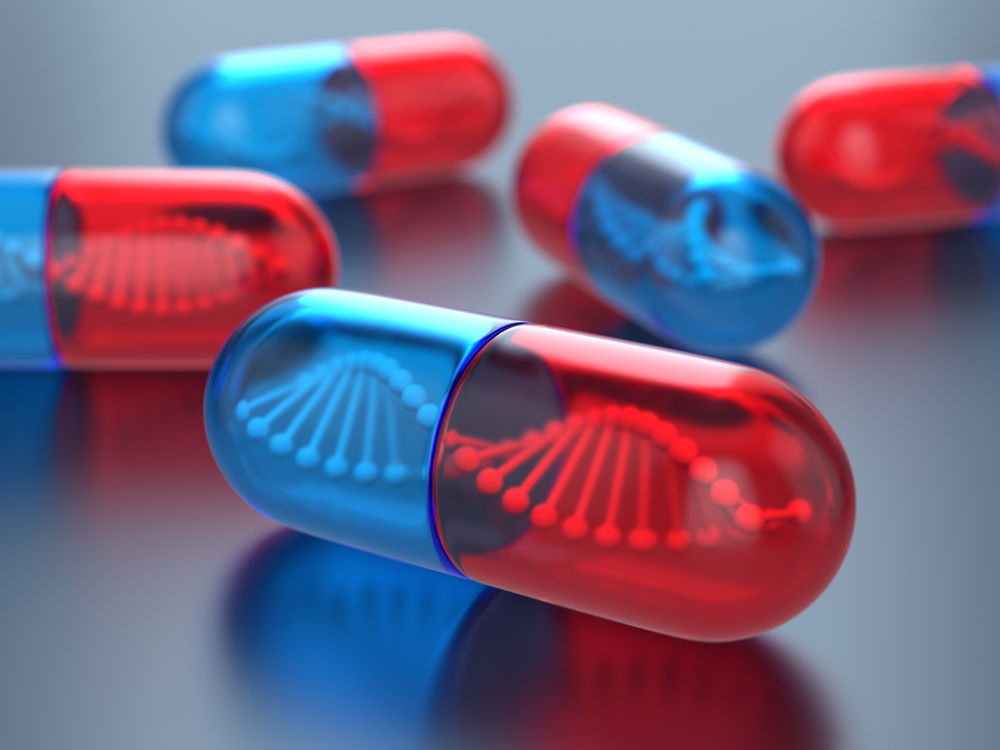 Richard Shelton and Nita Limdi are studying the effectiveness of genetic testing to improve prescribing mediciations for depression.Whether prescribing a medication to lower blood pressure, ease pain, or treat anxiety, a doctor relies on a few key pieces of patient information to determine the proper medication and dosage. A patient’s symptoms, medical history, age, and weight will likely influence the doctor’s decision. In the near future, though, there may be another critical element to determining a person’s correct prescription: his or her genetic profile.
Richard Shelton and Nita Limdi are studying the effectiveness of genetic testing to improve prescribing mediciations for depression.Whether prescribing a medication to lower blood pressure, ease pain, or treat anxiety, a doctor relies on a few key pieces of patient information to determine the proper medication and dosage. A patient’s symptoms, medical history, age, and weight will likely influence the doctor’s decision. In the near future, though, there may be another critical element to determining a person’s correct prescription: his or her genetic profile.
Clinicians have long known that people respond to drugs in different ways. Two patients with the same disease who present identical symptoms may have opposing responses to the same treatment. One patient may have more serious side effects, or the drug may not work in one patient despite being effective in the other.
“If you look at some of the blockbuster drugs we use to treat common diseases like asthma, diabetes, and depression, they only work in about 40-50 percent of patients,” says Nita Limdi, Pharm.D., Ph.D., MSPH, a professor in the UAB Department of Neurology. That means many patients’ conditions go untreated, or they have to try drug after drug to get their symptoms under control. But Limdi says there’s a way to change that: genetic tests.
Limdi works alongside a growing cadre of other UAB researchers in the burgeoning field of pharmacogenomics, which aims to find links between patients’ genes—their DNA—and their response to drugs. By using this information to match the right medicine to the right patient, researchers believe they can help patients get relief and save time, money, and even lives.
Open Hearts
Doctors have known for more than a decade that clopidogrel, or Plavix®—a drug that helps prevent blood clots and lowers a person’s risk of heart attacks and strokes—is less effective in some patients. Once it is in the body, clopidogrel (Plavix) is converted into its active form by an enzyme called CYP2C19. However, some people’s genes make CYP2C19 less effective at converting the drug. Stuck in an inactive form in these patients, Plavix can’t do its job to prevent blood clots.
More than 1 million heart disease patients in the U.S. undergo stenting to open a clogged blood vessel. Over the past two years, Limdi and her UAB colleagues collaborated with researchers around the country to determine the impact of conducting genetic testing on patients when they get a stent placed and using that genetic information to decide whether or not to prescribe Plavix.
“By testing for that one gene, you can now determine the people who can and cannot convert this drug into its active form,” Limdi says.
In a collaborative analysis including 1,815 patients undergoing stenting, 30 percent of patients had gene variants that made CYP2C19 less effective at converting Plavix into its active form. The researchers found the rates of death, heart attack, and stroke decreased by nearly half when this patient group was prescribed alternative medications. Limdi notes tailoring therapy can not only benefit patients, but it can also save valuable resources throughout the health care system.
“When I think about pharmacogenomics, I’m thinking of both individual patients and the broader population,” she says. “With Plavix, we can now shift the needle at the population level.”
Limdi has also studied genetic variants that affect how people respond to the blood thinner warfarin, or Coumadin. She has found the results vary by race, highlighting the importance of including minority populations in pharmacogenomics trials—something that is a particular strength of UAB’s program. “Not only does our diverse population advance the science, but it also impacts the patients we treat,” says Limdi.
Direct Solutions
 According to many researchers, depression is a disease that would benefit greatly from a pharmacogenomics approach. It is notoriously difficult to treat, with many patients trying a long list of common antidepressants before finding one that works.
According to many researchers, depression is a disease that would benefit greatly from a pharmacogenomics approach. It is notoriously difficult to treat, with many patients trying a long list of common antidepressants before finding one that works.
“Most people with depression will eventually respond to some kind of antidepressant treatment, but any given antidepressant has only about a one in three chance of working,” says Richard Shelton, M.D., the Charles Byron Ireland Chair of Psychiatric Research and a professor in the UAB Department of Psychiatry and Behavioral Neurobiology. “In people with depression, oftentimes we don’t get a second chance. People may give up on medication after trying one that doesn’t work. In the worst-case scenarios, the person may commit suicide.”
But a growing body of research suggests that genes involved in drug metabolism, or linked to depression itself, can guide health professionals to choose antidepressants that work on the first try for their patients. Nearly a decade ago, Shelton was on the team of researchers who discovered some of these key gene mutations.
Now, Shelton, Limdi, and others at UAB are working to bring that knowledge to the clinic. They are studying the impact of two different commercially available genetic tests: the GeneSight Psychotropic test and the GenoMind Genecept Assay. Each determines whether a patient has any known mutations that can influence antidepressant effectiveness.
For now, Shelton’s group is using genetic tests after patients’ depression has failed to improve after one or two standard medications. The results help inform which drug to try next. But when the large studies on the GeneSight and GenoMind tests—in which Shelton and his team of researchers are participating—are published, more doctors may start using the tests and more patients may be targeted, he says.
“A lot of clinicians are taking a wait-and-see approach,” says Shelton. “In the future, we’re going to take data from multiple levels to guide treatment. We get the most predictive power by combining a patient’s genetic information with their other clinical characteristics.”
Changing the System
Convincing health care providers to adopt pharmacogenomics testing across a broader range of health care systems, diseases, and types of treatments, however, will be challenging. “Implementing new technologies is always hard,” says Limdi. “It requires people to change their behaviors.”
More than 130 FDA-approved drugs already include pharmacogenomics information in their labeling—statements informing clinicians that genetic information can help prevent complications and determine who will benefit from taking a drug. But most people who are prescribed those 130 drugs aren’t offered genetic tests.
Even in the case of CYP2C1—where Limdi’s study found genetic testing led to a 50 percent decrease in deaths, heart attacks, and strokes—Limdi says many cardiologists don’t think the evidence is strong enough to make the decision to offer all patients the testing.
“There need to be pragmatic clinical trials where we pull data from a lot of sites,” she says. “And pharmacogenomics is starting to do this well. We’re asking researchers to step outside their normal paradigm of publishing first and instead collaborate to build bigger datasets and conduct more robust analyses of clinically relevant outcomes.”
At the School of Medicine, the lessons Limdi and her colleagues learned from implementing the CYP2C19 tests in stent patients will help them apply pharmacogenomics more broadly. It was intentional, Limdi says, to start with stent patients under the care of UAB cardiologists. “In that scenario, there’s one physical location—the cath labs—where all patients are stented,” she says.
“We could really focus in and understand the pressures and challenges of implementing something like this.”
Her team found that giving a test that can be conducted quickly and ordered through the existing electronic health record system without interrupting a doctor’s normal workflow was the key. “Implementing pharmacogenomics tests for something like depression, though, will be much more difficult because of the number of patients and all the different locations they can be seen,” says Limdi.
Limdi imagines a future where, as a matter of routine medical practice, all patients undergo a large panel of pharmacogenomics tests and that information is stored in their health records for future use. “Years from now we might have this information on everybody,” says Limdi. “For now, let’s figure out who is the most likely to benefit from this; let’s build the interventions; let’s collect the evidence.”
By Sarah C.P. Williams